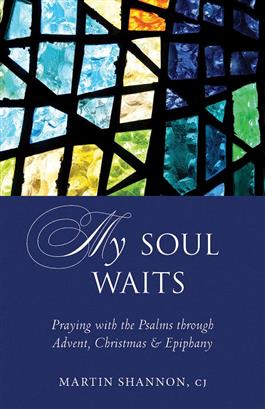From the Introduction to My Soul Waits: Praying with the Psalms through Advent, Christmas & Epiphany by Martin Shannon, CJ
In his rule for monastic life, St. Benedict wrote that the life of a monk should be like a continuous Lent (chapter 49). He acknowledged that not everyone has the strength to do this (how’s that for understatement?), so, at least during the liturgical season, he wanted his monks to take on some additional and intentional acts of self-denial, all the while never forgetting that the essential aim of Lent is to look forward to Easter with joy and longing. Life has plenty of asceticism built in already (most of it unexpected), and it is nothing if not a hope and desire for resurrection in the end. So, even though he didn’t, perhaps Benedict could have said something similar about Advent.
I live in an ecumenical monastic community of both celibate and married men and women, a modern expression of an ancient way of life in which St. Benedict’s voice keeps whispering insights into our ears. The idea of seriously embracing the particular character of each liturgical season, though not exclusive to Benedict, of course, is one of those insights. With the arrival of Advent, we change the color of our vestments (we all wear albs and scapulars to liturgy); our chants take on a new character; we begin to add certain elements to our surroundings (the number of candles in the church multiplies, for example); and, individually, we may take on additional forms of personal prayer and fasting. And all the while, we refuse to add Christmas carols to our repertoire of hymns until we actually get to Christmas. We are fairly uncompromising about that. Advent has its particular emphasis on preparation, getting ready, longing for, making room, and we don’t want to get ahead of ourselves. The meaning is in the waiting. Arriving has its own significance, and the two should not be confused.
So, yes, the life of a monk, or of any Christian for that matter, should be, and in fact is a continual Advent. Until the day of Christ’s coming—either to re-enter this world with more splendor than we can imagine or to take us to his world (more splendorous still)—we are limited to and gifted with lives of waiting.
One thing we do at the Community of Jesus while we wait, through both the season of Advent and throughout our lives of continuous Advent, is sing the psalms. The psalms are the prayers and praises of people who started waiting long before we did, a vocabulary is given by heaven to help both them and us to learn its language and to get ready to sing in its halls. As the world spins, there is not a moment that passes in which the words of the psalms, in any number of languages, are not being sung. The whole world is waiting.
The ascending and descending notes of life are sounded mostly without warning, and part of my learning to get ready and to make room is to go with these ups and downs as they come, and to find in each one a new chord for the “new song.” The psalms are tried-and-true instruments upon which the songs of my life can be played out while, in Advent and in every other time, my soul waits.
